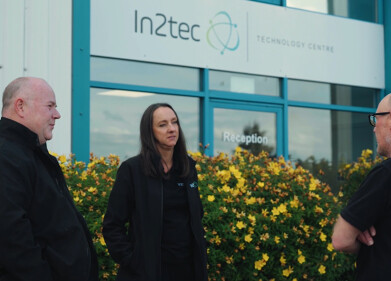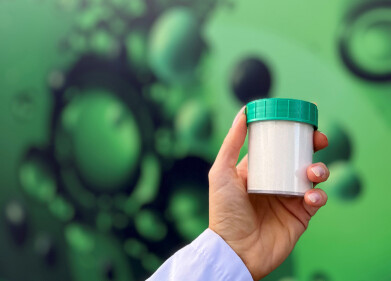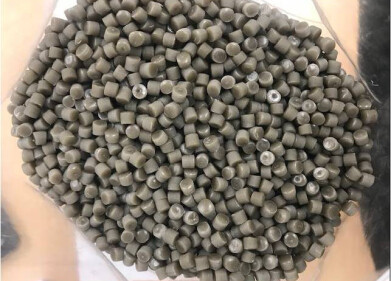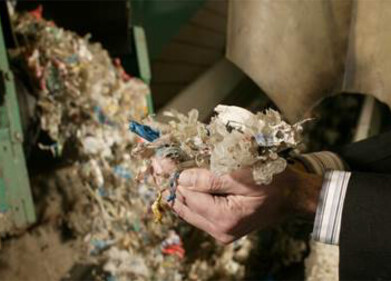-
 Coarse impurities can easily block pumps and lines in biogas and sewage plants. Here, a grinder installed upstream provides increased fluidity and operating reliability.
Coarse impurities can easily block pumps and lines in biogas and sewage plants. Here, a grinder installed upstream provides increased fluidity and operating reliability. -
 The compact M-Ovas® coarse material grinder can be installed anywhere and directly in the line.
The compact M-Ovas® coarse material grinder can be installed anywhere and directly in the line.
Waste Management
Risk of congestion averted: Robust grinder prevents shutdown of system caused by coarse material in the biomass or sludge
Nov 24 2016
In order to be economically viable, biogas plants today must be able to be operated using a variety of energy crops and bio waste. However, changing sources can rapidly become a problem for the operating company, as the consistency and composition of the biomass is changing with it and therefore difficult to predict. Coarse material may continue to block lines and pumps – a phenomenon that the operating companies of sewage plants must regularly combat. From this experience, NETZSCH has developed different series of grinders in order to protect the units installed downstream and, thus, increase the reliability of the process.
Silo maize, chicken manure with straw, liquid cow manure – practically everything that is produced in agriculture can be utilised for generating biogas. However, many of these media present a challenge when planning the plants. The results extend from serious damage to the units through to operating shutdown. It is not easy to predict the quality of the biomass, thus, the only solution is overdimensioning, to the detriment of efficiency.
Robust construction for high reliability of process
An economically better alternative here is presented by reliable preliminary grinding of the medium. Large hazardous parts in the material mixture are destroyed and the medium is homogenized overall, whereby, it is made more fluid and can be reliably pumped. For this, NETZSCH has developed two designs of the cutting plate grinder
M-Ovas® that attain throughput rates of up to 300 m³/h. Even at 12% dry matter content, up to 80 m³/h can be achieved. The basis for this is its hydrodynamic interior and, in particular, the cutting mechanism integrated in the housing cover: This combines an edge made of wear-resistant, hardened steel that can be used on both sides and a knife head with hard metal blades. A flywheel assists the grinding and, thus, saves energy so that only low drive power is required. Due to the product inlet and outlet being at the same height, the grinder can be directly integrated in a horizontal line, or connected to an inlet port rotated through 90°.
Individual adaptation to the application requirements
In addition, a heavy matter collection separator is integrated in the M-Ovas® grinder. Thus, heavy parts such as stones, are separated from the actual biomass when passing through the plant, before it can damage the machines installed downstream. The sedimented materials can be removed easily through a separate cleaning and drainage aperture.
The grinders can each be adapted for specific applications, thus, amongst other things, there are different geometries of perforated plats depending on the application. This flexibility can contribute, for example, in a small biogas plant in which leftovers of food and grass cuttings should also be recycled in addition to manure, liquid manure and maize. The dry matter content was approximately twelve percent. The cutters, which were already built in were not suitable for this substrate. The pieces were still too coarse after processing and blocked the pumps. In contrast, after initial test operation on a 4 kW drive and perforated plate with approximately 18 to 20 mm sized holes, the installation was converted to the M-Ovas®, whereupon the mixture can be transferred with no problem at 8 to 10 m³/h to the connected NETZSCH progressing cavity pumps. Since then the plant operates without further malfunctions.
Author: Michael Groth, Head of Business Field Environmental & Energy
Events
Nov 26 2024 Paris, France
Nov 27 2024 Istanbul, Turkey
H2O Accadueo International Water Exhibition
Nov 27 2024 Bari, Italy
Biogas Convention & Trade Fair 2024
Nov 27 2024 Hanover, Germany
Dec 11 2024 Shanghai, China






-as-feedstock.jpg)






